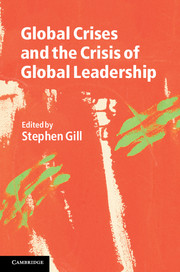Book contents
- Frontmatter
- Contents
- Contributors
- Acronyms
- Acknowledgements
- Introduction: global crises and the crisis of global leadership
- Part I Concepts of Global Leadership and Dominant Strategies
- Part II Changing Material Conditions of Existence and Global Leadership: Energy, Climate Change and Water
- Part III Global Leadership Ethics, Crises and Subaltern Forces
- Part IV Prospects for Alternative Forms of Global Leadership
- 10 Global democratization without hierarchy or leadership? The World Social Forum in the capitalist world
- 11 After neoliberalism: left versus right projects of leadership in the global crisis
- 12 Crises, social forces and the future of global governance: implications for progressive strategy
- 13 Organic crisis, global leadership and progressive alternatives
- Glossary
- Bibliography
- Index
10 - Global democratization without hierarchy or leadership? The World Social Forum in the capitalist world
from Part IV - Prospects for Alternative Forms of Global Leadership
Published online by Cambridge University Press: 05 June 2012
- Frontmatter
- Contents
- Contributors
- Acronyms
- Acknowledgements
- Introduction: global crises and the crisis of global leadership
- Part I Concepts of Global Leadership and Dominant Strategies
- Part II Changing Material Conditions of Existence and Global Leadership: Energy, Climate Change and Water
- Part III Global Leadership Ethics, Crises and Subaltern Forces
- Part IV Prospects for Alternative Forms of Global Leadership
- 10 Global democratization without hierarchy or leadership? The World Social Forum in the capitalist world
- 11 After neoliberalism: left versus right projects of leadership in the global crisis
- 12 Crises, social forces and the future of global governance: implications for progressive strategy
- 13 Organic crisis, global leadership and progressive alternatives
- Glossary
- Bibliography
- Index
Summary
Summary
The globalization protest movements offer examples of the dilemmas that a search for democratic transnational political agency, and corresponding forms of leadership, are likely to encounter in coming years. Nevertheless, and despite their limitations, they have brought the question of democratic change onto the agenda of world politics, building on the alliances between transnational social movements that have existed for decades, or even centuries. It is now very difficult to ignore the social movements, non-governmental organizations, critical think tanks and other actors that are challenging the financial and cultural supremacy of transnational capitalism. Even if it is misleading to claim, as The New York Times did after the anti-war protests of February 2003, that they have become the world's ‘second superpower’, they form part of any comprehensive picture of the new world politics. What, though, is this new politics? This chapter reflects on this question without assuming that political change is necessarily tied to conquering the state. It uses the World Social Forum as a key example, as it symbolizes many questions of articulation between social movements, questions of leadership and the construction of a new common sense implicit in the new global politics.
Introduction
The new global movements emerged in the eyes of the global media with the WTO meeting in Seattle in 1999. Since then the WSF has opened a window for contestations about the future of humanity. The deeper roots of these movements originate in the crises and contradictions of North–South relations, in particular in resistance to the policies used to download the effects of the Third World debt crises of the 1980s through neoliberal reforms. In these contestations, the various groups usually grouped together as ‘global civil society’ have increased in visibility and in agenda-setting capacity.
- Type
- Chapter
- Information
- Global Crises and the Crisis of Global Leadership , pp. 181 - 198Publisher: Cambridge University PressPrint publication year: 2011
- 2
- Cited by



